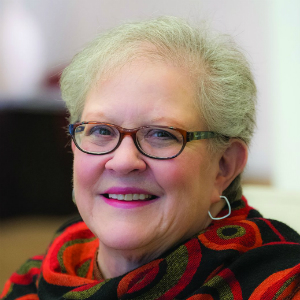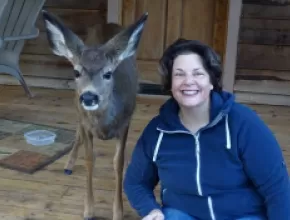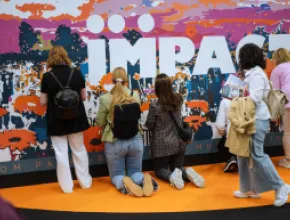I reached out to a whole bunch of people I’ve known well and a little through my many years. Some of them have familiar faces and names; others are those you may not know.
We chose not to assign names to any of the information.
As noted in the blog, if you want to try to figure out which quotes belong to whom, do so and send to me at FridayWithJoan@aol.com. I'll award a prize to anyone who gets them all—or the highest percentage, which has to be at least 50 percent of quotes from questions 1 and 3—right!
The comments have been edited for space and clarity. If by doing so, we’ve misquoted any of those who responded, our apologies.
1. How long have you worked in the hospitality industry? Always in the same area you are now or in a different area? (Editor's Note: 24 responses are listed below, each paragraph is a new response).
27 years. That doesn't include the six before I graduated from college when I worked in restaurants and hotels. The hospitality/meetings industry is the only industry I've ever known. I started out at a hotel's front desk, and then meeting planner, CVB sales manager, catering manager, special events planner, association executive, lawyer, speaker and professor, sometimes more than one of these at once.
24 years. I have been a meeting planner or event producer, mainly on the agency side, currently at a crown agency, with 18 months as the event planner for a mobile app company.
33 years. I started at a convention sales hotel’s front desk at 19. I’ve spent most of the time in meetings/convention sales, first for a hotel chain and then for a DMO. I was always considered a supplier within the industry
17 years. I’ve been a corporate event and tradeshow manager for one company, my only role. Prior to joining this company, I worked in advertising, publishing, direct mail. I have a Masters in Cinema Studies from New York University.
50+ years. It’s all been in meeting planning though were I younger, I might have said as a “meeting professional.” I started my own meeting planning business in 1981. In 2016 I came out of a two-year retirement, taken for family reasons, and became executive director of an industry association.
59 years. I started working in our family restaurant at 16. I spent 15 years in the restaurant industry and 35 years in education. I am retired from full time work, and now, to supplement my pension and keep me busy and active with the industry, I consult, teach online, write books and present webinars.
38 years. I opened a D.C. convention hotel, then worked in other hotels and then moved on to DMOs [aka CVBs.] I’ve been with my current employer, a Midwestern DMO, for 17 years, now working remotely.
20 years. I’m with an independent meeting management consultancy. Before that, I was in the insurance and retail industries.
30 years. I began my career working in travel, first as a tour operator offering charter packages to various vacation spots, then as a travel agent until 2002. In 2002, my spouse started an events design and decorating company. Now in our 70s we are accepting less work—a compromise—since one of us wants to retire and one of us doesn’t!
55 years. I’ve always been in hotel sales and marketing, sales training and teaching.
43 years. Sometimes it seems like 100 years. [Joan says: I concur!] After officially retiring, I do task force work for the hotel company for whom I’d worked for many years.
26 years. I’ve always worked at a DMO. The first eight years were in sales and the remainder in convention services. Prior to this, I worked for a small daily newspaper and did public relations and publicity for a library system.
45 years. I began in academia, then headed a professional society’s meetings, and for the last 20 years I’ve been owner of a technology consulting and training company.
34 years. This includes work as a bellman during college. I began my career in hotels (bellman, front desk, front office management, sales, ADoS and DoS) and switched to planning in 1994. And though I’m not retired, I keep trying to do so!
44 years. In the industry, they used to call the non-for-profit sector in which I worked the SMERF (Social, Military, Educational, Religious, Fraternal) market. Now they call it the “multicultural market,” which includes African American, Latino and other ethnic associations. I’d always been in meetings. I retired in 2016—it was the right time for me. You have to know when to leave the party. I like to keep my hand in and occasionally work with planners, colleagues or friends when they need help with a project, proposal, contract or need industry-related advice.
14.5 years. My work is in the exhibition industry. I’ve always been in the same segment/role.
25 years. I’ve always worked in tradeshows and exhibitions and I can’t imagine retiring!
11 years. During college, I worked with concerts. During grad school I worked part-time with a sports team and doing concerts. Then I moved to the corporate side in commercial food service equipment. Since 2010, I’ve been a consultant in the tradeshow side of the industry.
45 years. It’s all been as a volunteer planner for science fiction conventions with commitments through 2024. I retired from a job in information technology a few years ago.
19 years. I started in the restaurant industry when I looked old enough to work and began in the events world as a freshman in college at age 18.
41 years. I was in hotel sales for 35 years and then in hotel operations for six. I’ve recently retired.
25+ years. I started as a meeting planner, then went to hotel operations, then hotel sales in government meetings, and now I’m a government meeting planning contractor.
2 years. I’m a supplier to the industry after graduate school.
40 years. My first job out of college was working for a nonprofit organization selling handcrafts made by low income men and women living in the 13-state Appalachian Mountain region. One of my responsibilities was to organize an annual Appalachian Cultural Festival, which featured musicians and dancers from Kentucky and Virginia, plus craftsmen and women selling and demonstrating their beautiful work: quilts, pottery, wood crafts, etc. Now, I’m in the adult learning segment of the industry where I have spent almost my entire career. Specifically, I’m in the business of designing, building and operating learning centers and conference centers in which the primary activity is adult learning.
2. How do you refer to your segment of the industry?
The industry label has always been a challenge for me, being a "word" person. I usually say "meetings industry" to anyone in the industry, "hospitality and tourism" to those who have no clue about the meetings industry.
Adult learning segment.
Corporate tradeshows.
First travel, then design and decor of their ancillary events.
Event services for a DMO.
Not-for-profit organization.
Technology consulting.
Meeting management consulting.
Meetings Industry, sometimes Meetings & Incentive Travel.
Trade Shows and Exhibitions.
Tradeshow and event consulting and logistics. We typically work between companies and the event or venue as a liaison.
Catering and event services.
Hotel sales and marketing.
Social media strategy and implementation for meetings.
3. How old are you? (Editor's Note: Summary of responses from Joan provided below).
The ages ranged from 30 to 88, with the average being 58. I was surprised! It makes me wonder what happens when all of us retire (if we do!) and how we will transmit the history and knowledge to those who are new.
Or will this industry, whatever we call it, continue to repeat itself over and over, seeing only technology as what makes meetings different and interesting.
Won’t the basics of site selection, contingency planning and ethical practices still need to be known?
4. What do you think is a “universal truth” about what we do/meetings/how we operate? (Joan's Note: These are divided by personal quote, edited in some cases, with the universal truth highlighted).
I will (ironically) go with a Bible quote for this one: Ecclesiastes 1:9 "...there is nothing new under the sun." After so many years in the industry, I see the same issues cycle through over and over—technology, safety and security, design, engagement, etc. Yes, there may be advances in technology, but that just creates a variation on a theme. Likewise, new and different security concerns—but always security concerns. The issues ebb and flow like the tides, usually leaving few to no lasting best practices behind so that we treat them as brand-new issues when they arise again (predictably) in a few years. Cynical me.
Internal view: "We are business professionals with a great sense of design and attention to detail." External view: "It must be fun to plan all those great parties."
That face-to-face meetings are extremely important. I worked through many of the "scares" that face-to-face meetings would be greatly reduced or eliminated, as technology continued to advance. However, the need for face-to-face interaction has remained a constant. Yes, there are some types of meetings that have been replaced with other forms of communication, however, time has shown that there continues to be a strong need for people to join in face-to-face meetings and personal engagement ... maybe even more so now DUE to the rapid advancement of technology.
Event planners are a dedicated group of professionals who work long hours creating experiences and environments that facilitate the business of meetings and events generating results for their companies and corporate clients.
Hah! Why not an easy question like achieving world peace?! I guess my answer is that there are a few “universal truths”: 1. It’s always been, is and always will be a people business. In the current era, things have become much more impersonal due to technology and the commoditization of our work. 2. No matter how slick the new technology, the basics (“blocking and tackling” for football fans) are still there: planners have to do their homework (plan!) and the suppliers have to do their homework, and they both have to understand others’ needs and deal with each other ethically. All the rest is commentary!
We are in a people business. And, the meetings industry is a very large part of the education of our citizens. Roy Evans [past CEO of PCMA] once said that on any given day, there are more people being educated in meeting rooms in the U.S. than are in college classrooms. (I have used education I have received at meetings to keep my classes fresh and updated.)
I don't think there is a universal truth. Things change with each city/situation/with each client. For example, each time we do a site visit with the current DMO with whom I work we make it personal for the planner/the group and the meeting.
You have to be detail-oriented, a bit OCD, have great organizational skills, be well-connected, and have vast knowledge of industry performance tools and excellent time-management skills.
As long as there are people there will be celebrations. Trends come and go and budgets loosen or tighten depending what’s going on in the world, but people are going to have birthdays and weddings and corporations are going to have product roll-outs and anniversaries. And so there will always be special events and people will be there to service them.
There is one big thing that has been a definite, positive result of what we do: the building of long lasting RELATIONSHIPS. We sometimes think of the value of relationships when we are buying or selling, and how building relationships helps in the process. However, we neglect to think about not only making the deal, but also how this affects our life over the years. It is also the attendees at the meeting events who develop relationships just by being at the meetings.
I believe that the industry has changed from the hospitality business to the business of hospitality. It doesn't feel as gracious or as kind and trusting as it used to ... but then I guess that's true of our world today.
Of the many “universal truths,” the top two are maintaining your credibility and “if it ain’t on the page, it ain’t on the stage,” the latter I learned from Dee Chang in a CMP study course. Your credibility is all you have. Your word has to be your bond. People have to know/believe that you mean what you say and that they can trust you. I include ethics under credibility. Ethics is a big problem in this industry. You don’t know who knows who and how people are connected. The underpinning of our ability to do business is trust, both in our colleagues and our industry partners. Word will get around if you don’t honor your word or have questionable ethics. Your name is all that you’ve got. Everything else is tenuous. It’s a small industry.
People love to be with friends. People love to travel. People love to be treated as cherished guests. A convention is an opportunity for someone to step out of her daily routine to be with friends in a new and interesting place, and have wonderful experiences to take home as part of her continuing education. It’s that simple. The basics have not changed. It’s about people first and last.
When you reduce events to their essential element, we “bring people together.” Meeting professionals make the world a better place! Your reputation is a very important factor. If you are not honest in your dealings, you won’t last. Those that survive and thrive in this industry tend to be great individuals who are honest, intelligent and dedicated.
Our job is often the combination of a kindergarten teacher and mayor of a small town. That said, we save our clients from themselves [by telling them] why what they might want to do won’t work [in order to potentially mitigate damages later]. We are in the people business. We manage experiences and expectations.
The essence of what we do—be that in meetings/incentive travel/events/exhibitions—is to bring people together to move something forward—be that a relationship, learning, research, a business objective. We create the opportunities for those intangible sparks that happen when people are together face-to-face.
We get an adrenaline rush from [our work]—are “meeting junkies.” I get two rushes: one from actually being at the show, seeing it all come together, and the other from teaching people what I’ve learned, most of it by “hard knocks."
Success is in the attention to details. Without being aware of the details, asking the right questions, and keeping the details organized, we won't be successful. I also think it's extremely important that we stay up-to-date in our learning. The industry is constantly changing and evolving with new technology and new challenges and it's our job to keep up on it.
The communication and processing of event specs and details detracts from the creative and proactive planning that allows suppliers and planners to cultivate the best experience for the attendees.
The “collective we” operates at only a fraction of our capacity. It comes together enough to focus on the end-user experience. We get caught in the weeds over ridiculous elements such as attrition and other idiotic contract elements.
We all have diverse experiences in the hospitality industry, we work hard, we get burnt out, we need to be valued, challenged and must have professional growth to stay current with this forever changing industry.
The meetings industry will always be two steps behind innovation because the barrier of entry for small business and innovation is too high. We don't do enough as an industry to differentiate the levels of suppliers. If we can't even get in the same room as planners we can't work with them to innovate and solve problems.
Things are different now, always have been, and always will be.
It is always about learning. Whether you call it a meeting, training event or exhibit, the common purpose of all of these activities is learning—learning about products, people and services.
Click here to view additional content in the 05.05.17 Friday With Joan newsletter.







